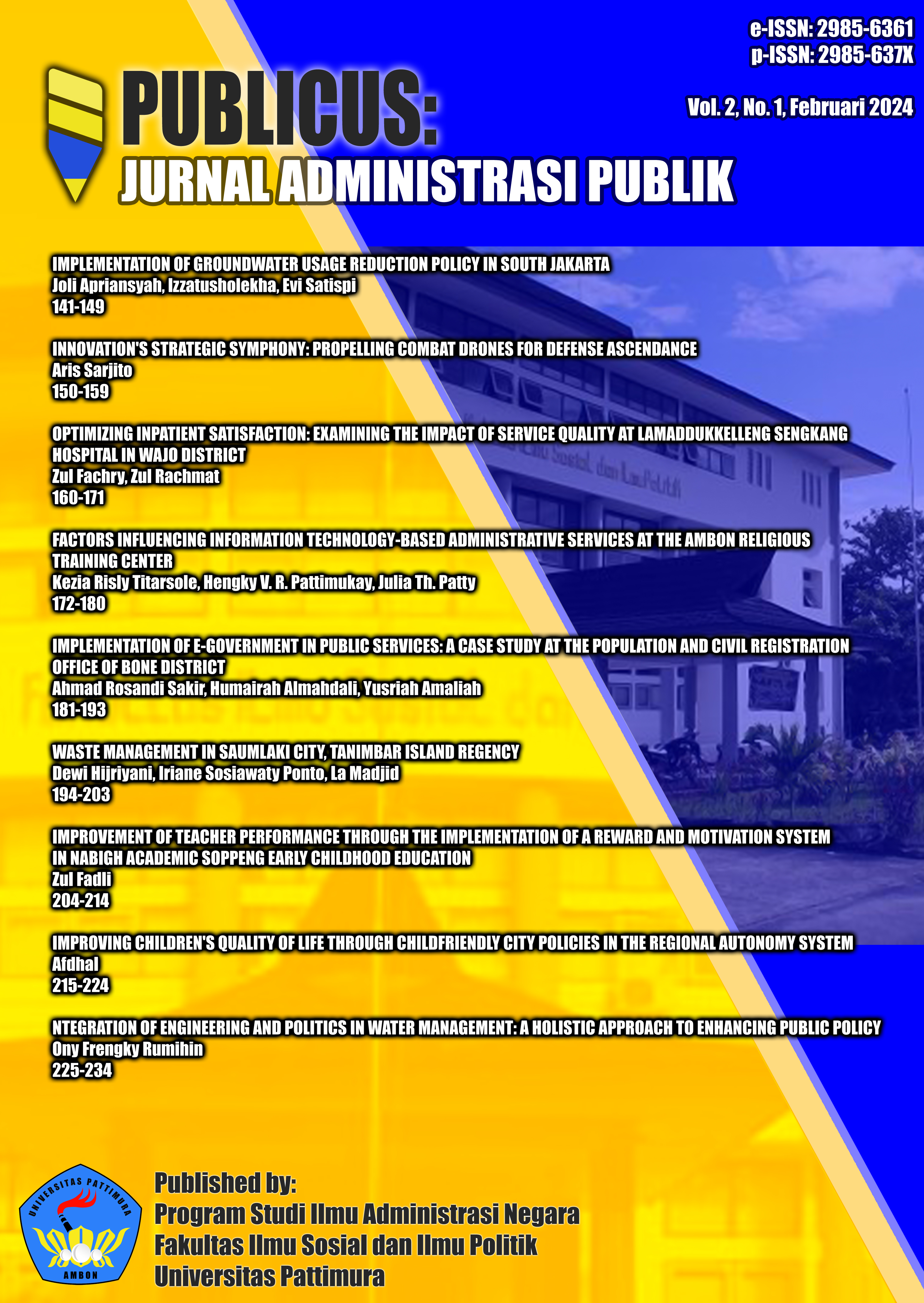IMPLEMENTATION OF GROUNDWATER USAGE REDUCTION POLICY IN SOUTH JAKARTA
Abstract
The accelerated urbanization of Jakarta is precipitating substantial transformations in the city's physical landscape, driven by urban planning initiatives, particularly in the realm of water resource management, with a pronounced reliance on groundwater. This surge in groundwater extraction, notably prevalent in South Jakarta, has led to increased land subsidence, necessitating the enforcement of Governor Regulation Number 162 of 2012. This regulatory framework delineates directives for water resource management, tailored to address the extensive use of groundwater in South Jakarta. This research aims to comprehensively analyze the implementation of policies designed to curtail groundwater usage in South Jakarta. Employing George Edwards III's Policy Implementation framework, four crucial indicators—communication, resources, disposition, and bureaucratic structure—are systematically investigated. Utilizing a descriptive, qualitative approach with data gathered through interviews, observations, and document analysis, the study reveals the pressing need for heightened communication efforts and identifies nuanced challenges in bureaucratic structure, particularly varying interests among agencies. The research advocates for intensified communication strategies and underscores the importance of inter-agency coordination, especially concerning established water tariffs.
Downloads
References
Basuki, T. M., Nugroho, H. Y., Indrajaya, Y., Pramono, I. B., Nugroho, N. P., Supangat, A. B., Indrawati, D. R., Savitri, E., Wahyuningrum, N., Purwanto, Cahyono, S. A., Putra, P. B., Adi, R. N., Nugroho, A. W., Auliyani, D., Wuryanta, A., Riyanto, H. D., Harjadi, B., Yudilastyantoro, C., … Simarmata, D. P. (2022). Improvement of Integrated Watershed Management in Indonesia for Mitigation and Adaptation to Climate Change: A Review. In Sustainability (Vol. 14, Issue 16). https://doi.org/10.3390/su14169997
Gambolati, G., & Teatini, P. (2015). Geomechanics of subsurface water withdrawal and injection. Water Resources Research, 51(6), 3922–3955. https://doi.org/https://doi.org/10.1002/2014WR016841
Muryati, D. T., & Triasih, D. (2021). Government Policy on Water Resources Management. ICILS 2020: Proceedings of the 3rd International Conference on Indonesian Legal Studies, ICILS 2020, July 1st 2020, Semarang, Indonesia, 111.
Neuman, W. L. (2014). What are the major types of social research. Social Research Methods: Qualitative and Quantitative Approaches. Boston: Allyn and Bacon.
Prihatinningtyas, E., Jasalesmana, T., Novianti, R., & Nafisyah, E. (2021). Study of Physicochemical of Rivers in DKI Jakarta Province. IOP Conference Series: Earth and Environmental Science, 934(1), 12058. https://doi.org/10.1088/1755-1315/934/1/012058
Silver, C. (2007). Planning the megacity: Jakarta in the twentieth century. Routledge.
Soejono, H. A. (2005). Metode Penelitian : Suatu Pemikiran dan Penerapan. Rineka Cipta.
Syaban, A. S. N., & Appiah-Opoku, S. (2023). Building Indonesia’s new capital city: an in-depth analysis of prospects and challenges from current capital city of Jakarta to Kalimantan. Urban, Planning and Transport Research, 11(1), 2276415. https://doi.org/10.1080/21650020.2023.2276415.
Copyright (c) 2024 Joli Apriansyah, Izzatusholekha Izzatusholekha, Evi Satispi

This work is licensed under a Creative Commons Attribution 4.0 International License.





.png)




